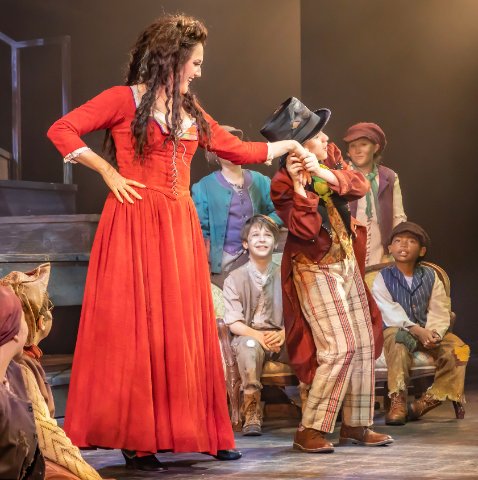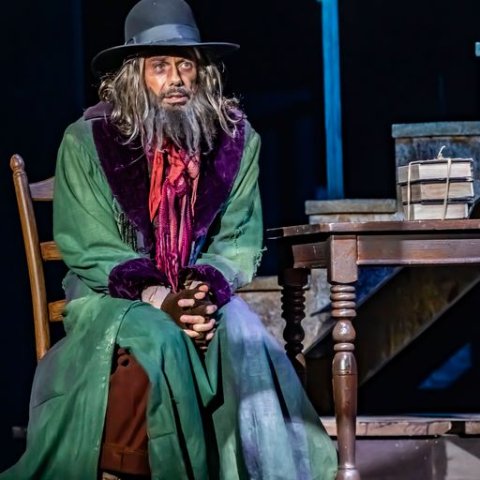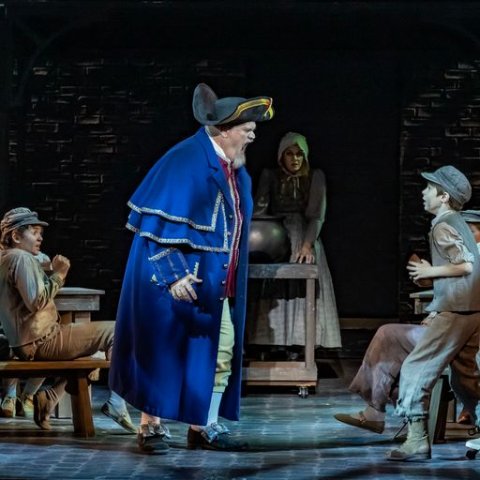Oliver!
Maltz Jupiter Theatre in South Florida
By: Aaron Krause - Mar 18, 2023
Maltz Jupiter Theatre’s current production of Lionel Bart’s beloved classic musical, Oliver!, is mostly a winner.
The professional, nonprofit company has assembled a talented cast that includes child actors who prove to be triple threats. Under Denis Jones’ inspired and sensitive direction, they are delivering believable performances blessed with energy, spontaneity, variety, and poignancy. In fact, the entire cast of adults and children mostly succeeds.
The production runs through April 2.
Mounting Oliver! is a massive undertaking. That might explain why theater companies infrequently stage the show.
For instance, the piece requires a sizable number of child actors who participate in big production numbers. In fact, Maltz Producing Artistic Director Andrew Kato said that the company has wanted to stage Oliver! for decades. However, the company needed a large enough playing space to accommodate the large cast and big production numbers.
With its newly renovated, Broadway-scale stage, Maltz Jupiter Theatre now has that space for this mammoth production, Maltz's largest yet. And Jones, a two-time Tony Award-nominated choreographer, uses the entire stage to the production’s advantage.
While the space is often crowded (Maltz’s cast comprises 18 Equity actors and 16 student performers), each performer has plenty of space in which to move. In fact, the production is almost in constant motion, making Maltz’s Oliver! a riveting theatrical experience.
Of course, Oliver! is an emotionally-fulfilling and action-packed musical. Bart, who adapted the story from Charles Dickens’ dark, classic 1830’s novel, packed the play with memorable songs, poignancy, danger, dramatic tension, and finally, relief and exultation at the happy ending.
But in order for us to fully feel that cathartic sense of relief at the end, a successful production of Oliver! needs to feature darkness. Maltz’s mounting is not the darkest Oliver! that I have seen. Nevertheless, the bleakness in Maltz’s production contrasts markedly with its liveliness and brightness.
Dickens’ grim novel serves as a harsh indictment of the cruel treatment of many orphans in mid-19th century England.
The story follows the titular pre-teenage orphan’s journey. Specifically, we follow his movements from a workhouse, where adults raised him, to his apprenticeship at a funeral home, and to London’s streets, where a gang of pickpockets befriend Oliver and provide him with food and shelter. However, the titular character’s ultimate goal is to find a family that will truly love him. And because he is such a likable boy, we root for him to find a permanent home, happiness, and love. Isn’t that what we all desire?
Oliver! reminds us that even in the bleakest of times, when all seems hopeless, we should not despair; there is always hope. In addition, Oliver! may make us think twice before lumping people into absolute, black and white categories of “good” and “evil.” For example, Fagin, the leader of the gang of pickpockets in London, is dishonest and a thief. For instance, he teaches the children to steal. Neither Dickens nor Bart ask us to shelter and feed the youngsters in his care. The Artful Dodger, a lad about Oliver’s age whose real name is Jack Dawkins, also exhibits positive and negative qualities.
Most, if not all, of the characters from Dickens’ novel are present in the award-winning 1968 film adaptation of Oliver!, as well as the stage musical adaptation. While the film and the musical basically follow the same storyline as Dickens’ source material, the adaptations may have displeased Dickens. Indeed, with their bright, jaunty songs and dances, the author might have argued that his bleak tale gets lost in all the liveliness. But again, Maltz’s production finds the darkness in the tale.
Scenic designer Michael Schweikardt helps to set the tone with his two-level, darkly colored, sturdy-looking set. Its spaciousness allows performers to freely move about the stage. Also, the set's multiple levels allow Jones to highlight specific performers when that becomes necessary.
The projection design by Zak Borovay includes a cinematic-like backdrop of England that looks impressively real. For instance, we can clearly see the sun casting its shadow against buildings, and smoke belching from buildings’ chimneys. The cinematic-like backdrop helps to create tension between the production’s dark and brighter moments.
In addition to focusing the actors, Kirk Bookman’s lighting helps to set a scene’s mood and contrasts bleakness from brightness.
Meanwhile, sound designer Scott Stauffer helps to ensure that we can hear and understand the actors. They speak and sing with clear, expressive, and strong voices. A 12-piece live orchestra, under music director Matthew Smedal, vibrantly accompanies these performers, who also dance energetically and in sync with each other.
Speaking of the actors, they endear us to their characters from the beginning. That is when a group of dirt-streaked workhouse children enter the stage carrying bowls for their gruel and sing “Food, Glorious Food.”
The number begins at a slow pace, and the youngsters walk slowly. However, the tempo quickens considerably as the song progresses. It is as though by merely imagining yummy food, the children suddenly gain more energy, and start jumping and dancing while still singing. At this point, their bowls have become dance props.
Instead of pitying themselves, the workhouse children remain positive by imagining food fit for royalty. We see such food (intended for the adults who run the workhouse) as the children imagine it. Just as imagining hearty fare transports the children, this production transports us.
“Food, Glorious Food” is one of several large production numbers in Oliver! There is also the showstopper, “Consider Yourself,” the upbeat “I’d do Anything,” and the lively “Be Back Soon." The Artful Dodger (a nimble Chase Bauer) and other cast members perform these songs animatedly. Such numbers contrast markedly, for example, with the ominous song, “My Name.”
As the Dodger, 12-year-old Bauer nails a Cockney accent, imbues the character with a carefree air, liveliness and confidence, and demonstrates a dynamic stage presence. An aura of mischief would further enhance Bauer’s portrayal.
Meanwhile, Jon J. Peterson’s vigorous, playful, and good-hearted Fagin is among the adult characters who share the stage with the children.
Peterson makes the part his own and avoids stereotypes (Dickens frequently refers to Fagin as “The Jew” in the novel). Peterson, backed by a violin, particularly shines in the patter-like song “Reviewing the Situation.” The performer sings the song quickly but clearly, mirroring the thoughts racing through Fagin’s mind. A hint of sneakiness would enhance this performance, particularly in numbers such as “You’ve Got to Pick a Pocket or Two.”
One of the strongest performances comes courtesy of Lindsey Corey. Her desperate, defiant, determined, and spirited Nancy commands the stage without overshadowing others. When Corey’s Nancy forcefully sings the ballad, “As Long as He Needs Me,” she does not come across as a subservient victim. Instead, Corey makes it clear that Nancy has chosen to remain with her abusive lover but on her own terms. Also, Corey’s Nancy is like a fierce mother bear to Oliver, trying to protect him from her lover.
Speaking of that lover, Cooper Grodin brings an understated menacing quality to Bill Sykes. However, there is room for Grodin to make his Sykes more fearsome.
Troy J. Stanley appropriately lends Mr. Bumble a pompous, unpolished, and temperamental demeanor, while commanding the stage. After the titular character asks for more gruel, Stanley’s Mr. Bumble responds by bellowing the word “More” in a manner that suggests incredulity.
Bumble and characters such as Dr. Grimwig (a cynical Wesley Slade) add comic relief to the tale.
James Michael Reilly gives us an honorable Mr. Brownlow, a stark contrast from Slade’s mocking and obnoxious Noah Claypole.
The star of this production is clearly 11-year-old Benjamin Pajak as the titular character. He shines in the role, lending the lad a choirboy-like purity. Pajak’s Oliver, with shining brown eyes, is believably sweet, polite, positive, and innocent.
When Pajak’s Oliver sings “Where is Love,” we hear authentic emotion in his voice. The youngster possesses a clear and strong voice and avoids coming across as cute. While Pajak’s Oliver will melt your heart when he sings “Where is Love” he will also move you when the boy peacefully and happily sings “Who Will Buy.” The song, a stark contrast from the show's darker moments, provides us with a glimpse of the kind of happy life Oliver could lead if he finds a family.
Pajak is a winner as Oliver, just as he triumphed recently on Broadway as Winthrop in The Music Man. Undoubtedly, this young actor has a bright career ahead of him.
Certainly, Pajak and Co. will leave you wanting some more after the actors take their well-deserved bows. But consider yourself warned: Tickets may be selling fast.
Maltz Jupiter Theatre’s production of Oliver! continues through April 2. In addition to performances, the company is offering master classes on the making of the production. For show times and ticket information, go to jupitertheatre.org. The theater is located at 1001 E. Indiantown Road in Jupiter. The phone number is (561) 473-1582.





